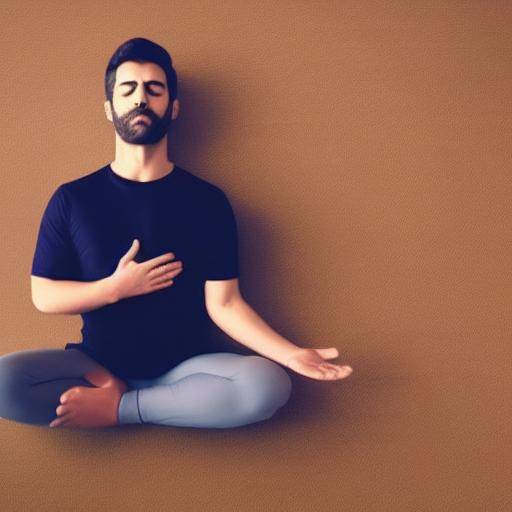
Guided meditation is a practice that, in recent years, has acquired popularity and recognition with its ability to promote mental and emotional well-being. This technique provides beginners with a smooth and structured introduction to meditation, making it ideal for those who are exploring practice for the first time. In this article we will explore in detail the importance of guided meditation for beginners, as well as initiation into meditation and care practices.
Introduction
Guided meditation has become a valuable tool for those seeking to cultivate inner tranquility, reduce stress and improve their mental focus and clarity. In this guide, we will enter the historical roots of guided meditation, explore its benefits and challenges, compare its different approaches, as well as provide practical advice and comments from field experts. In addition, we will answer key questions and analyze future trends related to this fascinating practice.
History and background
Guided meditation has profound historical roots that go back to ancient Eastern traditions, where the practice of meditation was an integral part of spiritual and philosophical life. Over the centuries, several schools of thought, such as Buddhism and Hinduism, have used meditation as a way of achieving enlightenment and inner peace.
In the modern era, guided meditation has acquired popularity, offering people practical and structured tools to enter meditation, joining the old teachings with contemporary approaches. This evolution has allowed guided meditation to adapt to current needs and lifestyles, becoming an accessible practice for a wide range of individuals.
In-depth analysis
The benefits of guided meditation are diverse and significant. Numerous scientific studies support their positive effects on stress reduction, the strengthening of concentration, the promotion of empathy and the promotion of mental health in general. This practice has proven its effectiveness in treating disorders such as anxiety, depression and post-traumatic stress disorder, making it a valuable therapeutic tool.
Despite its many benefits, guided meditation can also present challenges for beginners, such as the difficulty of maintaining concentration or managing unrealistic expectations. It is essential to understand that meditation is a process that requires practice and patience, and that results gradually develop over time.
Comprehensive review
The application of guided meditation extends to various spheres of life, such as the working environment, education, sport and health. Its ability to improve cognitive performance, strengthen emotional resilience and foster creativity makes it a valuable tool in professional and academic environments. Moreover, its potential to foster full attention and self-consciousness makes it relevant in the context of mental health and emotional well-being.
Within guided meditation, initiation into meditation is a crucial step for those who begin this practice. Providing clear guidelines and structured approaches allows beginners to adapt more harmoniously to the meditation experience, laying the foundation for long-term sustainable and meaningful practice.
The practices of the mind, for their part, overlap with guided meditation, as both invite full attention and conscious approach at the present time. The combination of both practices can enrich the meditative experience, providing a deep and comprehensive approach to personal development and self-reflection.
Comparative analysis
By comparing guided meditation, initiation into meditation and care practices, it is possible to identify their similarities and differences. While guided meditation offers a structured guide, initiation into meditation focuses on establishing a solid basis for individual practice, and attention promotes full awareness in all daily activities. However, all these practices share a common approach: the cultivation of full attention and the connection with the internal being.
Practical advice and recommendations
For those who are considering embarking on guided meditation, it is important to establish an enabling environment for practice, promote coherence in daily routine and maintain an attitude of openness and acceptance. In addition, exploring different breathing, visualization and listening techniques can enrich the guided meditation experience, allowing a greater connection with the present moment and facilitating deep relaxation.
In the process of initiation into meditation, patience and perseverance are fundamental. Establishing realistic expectations and adopting a compassionate approach to oneself is essential to nurture a lasting and rewarding meditation practice. Finally, by incorporating care practices into everyday life, it is possible to foster greater mental clarity, reduce anxiety and promote a renewed sense of calm and balance.
Industrial reflections and expert opinions
Experts in the field of psychology, neuroscience and spirituality have provided valuable insights on guided meditation, initiation into meditation and mind practices. Its observations highlight the importance of these approaches as effective tools for managing stress, improving emotional well-being and promoting self-transformation. Their analysis also highlights the need for greater integration of these practices into clinical, educational and labour environments, recognizing their potential positive impact on society as a whole.
Case studies and applications in real life
The impact of guided meditation, initiation into meditation and mind practices is reflected in a series of case studies that illustrate their relevance in everyday contexts. From reducing stress in corporate environments to emotional support in teaching centers, these examples demonstrate how these practices can significantly improve the quality of life of people and promote greater personal and collective harmony.
Future trends and predictions
As meditation and care practices continue to gain traction and acceptance in contemporary culture, it is to be hoped that their adoption will expand globally. The integration of these practices into labour, education and public health welfare policies is expected to continue to grow, recognizing their key role in promoting mental health and emotional resilience. In addition, the development of technologies and applications related to guided meditation and care practices will open up new opportunities for the accessibility and customization of these tools.
Conclusions
In short, guided meditation, initiation into meditation and mind practices represent powerful and effective approaches to the cultivation of mental tranquility, self-reflection and emotional well-being. These tools provide a solid basis for personal growth and self-realization, promoting a renewed sense of inner peace and emotional balance. By adopting these practices, people can strengthen their connection to the present and significantly enrich their life experience.
Frequently asked questions
What is the difference between guided meditation and attention?
Guided meditation focuses on structured behavior of meditation, often using visualization and breathing as tools, while the mind focuses on full consciousness and attention at the present time on all daily activities.
How long do you need to get benefits from guided meditation?
The benefits of guided meditation may vary from person to person, but for many tangible benefits can be started after consistently practicing for a few weeks.
Is guided meditation suitable for people with anxiety or stress?
Yes, guided meditation can be beneficial for people suffering from anxiety or stress, as it can help reduce the activation of the sympathetic nervous system and promote relaxation.
Is guided meditation a form of therapy?
Although guided meditation can be used as a therapeutic tool, it is important to note that it does not replace professional medical or therapeutic treatment. However, it can complement other forms of therapy and promote emotional well-being.
What are the differences between guided meditation and traditional meditation?
Guided meditation provides detailed instructions and hearing support during practice, which can be useful for beginners. On the other hand, traditional meditation usually involves individual practice and focusing on breathing or a concentration object.
Can guided meditation help improve sleep quality?
Yes, guided meditation can help reduce insomnia and improve overall sleep quality by promoting relaxation and reducing the frenetic mental activity that can interfere with night break.
In conclusion, guided meditation, initiation into meditation and mind practices offer a profound and meaningful way to emotional well-being and self-transformation. Through these practices, beginners can explore new dimensions of inner calm and self-consciousness, promoting a renewed sense of balance and mental clarity in their lives.


